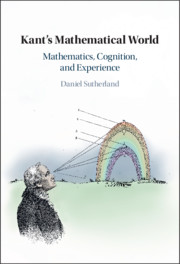Book contents
- Kant’s Mathematical World
- Kant’s Mathematical World
- Copyright page
- Dedication
- Contents
- Preface and Acknowledgments
- 1 Introduction
- Part I Mathematics, Magnitudes, and the Conditions of Experience
- Interlude The Greek Mathematical Tradition as Background to Kant
- Part II Kant’s Theory of Magnitudes, Intuition, and Measurement
- 7 Kant’s Reworking of the Theory of Magnitudes
- 8 Kant’s Revision of the Metaphysics of Quantity
- 9 From Mereology to Mathematics
- 10 Concluding Remarks
- Bibliography
- Index
9 - From Mereology to Mathematics
from Part II - Kant’s Theory of Magnitudes, Intuition, and Measurement
Published online by Cambridge University Press: 21 October 2021
- Kant’s Mathematical World
- Kant’s Mathematical World
- Copyright page
- Dedication
- Contents
- Preface and Acknowledgments
- 1 Introduction
- Part I Mathematics, Magnitudes, and the Conditions of Experience
- Interlude The Greek Mathematical Tradition as Background to Kant
- Part II Kant’s Theory of Magnitudes, Intuition, and Measurement
- 7 Kant’s Reworking of the Theory of Magnitudes
- 8 Kant’s Revision of the Metaphysics of Quantity
- 9 From Mereology to Mathematics
- 10 Concluding Remarks
- Bibliography
- Index
Summary
Kant’s reworking of the Euclidean theory of magnitudes and reformation of the Leibnizian-Wolffian metaphysics of quantity are in service of his project of explaining the foundations of mathematical cognition and the mathematical character of experience. The previous chapters revealed that Kant’s account is fundamentally mereological. The categories of quantity allow us to represent the part–whole relations among magnitudes, and Kant’s understanding of the role of the categories of quantity, the nature of composition, and the definitions of extensive and intensive magnitudes are all mereological. This introduces a gap between Kant’s mereological account of magnitudes and Euclid’s notion of magnitude for the latter is implicitly defined by its role in the theory of proportions – a richer, mathematical notion of magnitude. This prompts a closer look at what makes Euclid’s understanding of magnitudes mathematical. This chapter argues that Euclid’s geometry presupposes a tacit theory of measurement that is general, pure, and concrete, a theory that crucially depends on the relation of equality. It traces these presuppositions through the Euclidean tradition. It then argues that Kant also tacitly assumed the theory of measurement, but that he was aware of the crucial role that equality plays in bridging the gap between mereology and mathematics.
Keywords
- Type
- Chapter
- Information
- Kant's Mathematical WorldMathematics, Cognition, and Experience, pp. 240 - 280Publisher: Cambridge University PressPrint publication year: 2021

